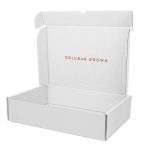In today’s rapidly evolving e-commerce landscape, where convenience and sustainability have become paramount concerns for both businesses and consumers, foldable packaging boxes have emerged as a game-changing solution. These innovative containers represent more than just a practical packaging option—they embody a fundamental shift in how we think about product delivery, storage, and environmental responsibility. As online shopping continues to dominate retail, the humble foldable box is quietly transforming supply chains and customer experiences worldwide.
The brilliance of foldable packaging lies in its elegant simplicity. Designed to be shipped and stored flat, these boxes occupy minimal space until the moment they’re needed. This space-efficient design translates directly into reduced storage costs for businesses and more efficient transportation. When an order comes in, these flat-packed miracles can be quickly assembled, filled with products, and dispatched to customers—streamlining the entire fulfillment process. The ease of assembly means businesses can optimize their labor costs while maintaining high packaging standards.
From an environmental perspective, foldable packaging boxes offer significant advantages that align perfectly with today’s eco-conscious market. Their flat-shipping capability means more boxes can be transported in a single shipment, substantially reducing the carbon footprint associated with logistics. Many manufacturers now produce these boxes using recycled materials, and their efficient design means less material is required overall. Furthermore, the durability of well-designed foldable boxes encourages reuse—customers can easily collapse them for storage and reuse them for shipping, gift-giving, or organizational purposes, extending their lifecycle and reducing waste.
The versatility of foldable packaging extends across numerous industries. Fashion retailers appreciate how these boxes can be customized to create luxurious unboxing experiences while remaining practical for storage. Subscription box companies benefit from the space savings during their massive packaging operations. Electronics manufacturers value the protective qualities that can be engineered into foldable designs. Even food and beverage companies are adopting specialized foldable packaging that maintains product freshness while offering convenient storage solutions for both distributors and consumers.
Brands that have implemented foldable packaging systems report remarkable improvements in their operational efficiency. The reduced storage requirements free up valuable warehouse space that can be repurposed for additional inventory or other functions. Shipping costs decrease significantly since flat-packed boxes weigh less and take up less space in transit to fulfillment centers. The assembly process, often requiring minimal training, enables businesses to scale their packaging operations up or down based on demand fluctuations without major infrastructure changes.
Consumer response to foldable packaging has been overwhelmingly positive. Modern shoppers appreciate the ease of breaking down these boxes for recycling compared to traditional packaging with complex material combinations. The clean, professional appearance of well-constructed foldable packaging enhances the unboxing experience, creating positive brand associations. Many consumers specifically mention the satisfaction of neatly collapsing these boxes for future use or easy disposal—a small but meaningful convenience in their daily lives.
As technology advances, we’re seeing even more innovative developments in foldable packaging. Smart designs incorporating tear-off strips, built-in handles, and interlocking mechanisms without additional tape are becoming more common. Some companies are experimenting with embedded QR codes that provide recycling instructions or connect customers to digital content. The integration of augmented reality experiences through packaging is another exciting frontier, where the foldable box becomes not just a container but an interactive platform.
The future of foldable packaging looks increasingly sophisticated, with materials science playing a crucial role in next-generation developments. Researchers are working on enhanced paper composites that offer greater strength with less material, water-resistant coatings derived from natural sources, and even biodegradable smart materials that can indicate temperature changes or product freshness. These advancements promise to make foldable packaging even more sustainable and functional in the years to come.
For businesses considering the transition to foldable packaging, the implementation process has become remarkably accessible. Packaging suppliers now offer comprehensive solutions including custom design services, material selection guidance, and minimum order quantities that accommodate businesses of all sizes. The return on investment calculation has become increasingly favorable as transportation costs rise and consumer preference for sustainable options grows stronger.
In conclusion, foldable packaging boxes represent far more than a logistical improvement—they symbolize a smarter approach to commerce that benefits businesses, consumers, and the planet simultaneously. As e-commerce continues to evolve, these versatile containers will likely become the standard rather than the exception, driving innovation in sustainable design while meeting practical business needs. The foldable packaging revolution is here, and it’s unfolding one box at a time, creating a more efficient and environmentally responsible future for commerce worldwide.




Leave a Message